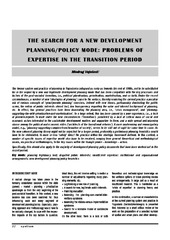Приказ основних података о документу
The search for a new development planning/policy mode: Problems of expertise in the transition period
| dc.creator | Vujošević, Miodrag | |
| dc.date.accessioned | 2018-12-26T10:52:28Z | |
| dc.date.available | 2018-12-26T10:52:28Z | |
| dc.date.issued | 2004 | |
| dc.identifier.issn | 1450-569X | |
| dc.identifier.uri | https://raumplan.iaus.ac.rs/handle/123456789/63 | |
| dc.description.abstract | The former system and practice of planning in Yugoslavia collapsed as early as towards the end of 1980s, not to be substituted for in the sequel by a new and legitimate development planning mode that has been compatible with the key processes and factors of the post-socialist transition, i.e., political pluralization, privatization, marketisation, and so forth. Under the recent circumstances, a number of new ‘ideologies of planning’ came to the surface, thereby rendering the current practice a peculiar mix of various concepts of ‘quasi/pseudo planning’ exercises, imbued with new biases, partisanship dominating the public scene, the notion of public interests almost lost, low transparency regarding the value and interest background of planning, etc. In effect, two general practices have been dominating the planning area, i.e., ‘crisis management’, and ‘planning-supporting-the-wild-privatisation-and-marketisation’. To a large extent, this has been caused by a poor experience, i.e., a lack of planners/experts to work under the new circumstances (‘transition’), paralleled by a lack of critical mass of social and economic actors interested in the sustainable development matters and supportive to them, and a wide spread anti-planning stance among the political and economic elites (‘architects of the transitional reforms’). A more modernizing and emancipatory model, e.g., ‘planning-supporting-complex-transformation of society’, seems to be still out of sight for some time to come. As the new coherent planning theory might not be expected for a longer period, preferably a preliminary planning heuristics would have to be elaborated, to more or less ‘safely’ direct the practice within the strategic framework defined. In this context, a number of specific issues of expertise would also have to be resolved, ranging from general theoretical and methodological issues, via practical methodologies, to the key issues within the triangle power – knowledge – action. Specifically, this should also apply to the majority of development planning policy documents that have been worked out in the recent period. | en |
| dc.publisher | Institute of Architecture, Urban & Spatial Planning of Serbia | |
| dc.rights | openAccess | |
| dc.rights.uri | https://creativecommons.org/licenses/by-nc-nd/4.0/ | |
| dc.source | Spatium | |
| dc.subject | planning legitimacy lost | en |
| dc.subject | disputed public interests | en |
| dc.subject | insufficient expertise | en |
| dc.subject | institutional and organisational arrangements | en |
| dc.subject | new development planning/policy heuristics | en |
| dc.title | The search for a new development planning/policy mode: Problems of expertise in the transition period | en |
| dc.type | article | |
| dc.rights.license | BY-NC-ND | |
| dcterms.abstract | Вујошевић, Миодраг; | |
| dc.citation.issue | 10 | |
| dc.citation.spage | 12 | |
| dc.citation.epage | 18 | |
| dc.citation.other | (10): 12-18 | |
| dc.identifier.doi | 10.2298/SPAT0410012V | |
| dc.identifier.fulltext | https://raumplan.iaus.ac.rs//bitstream/id/1677/60.pdf | |
| dc.type.version | publishedVersion |

